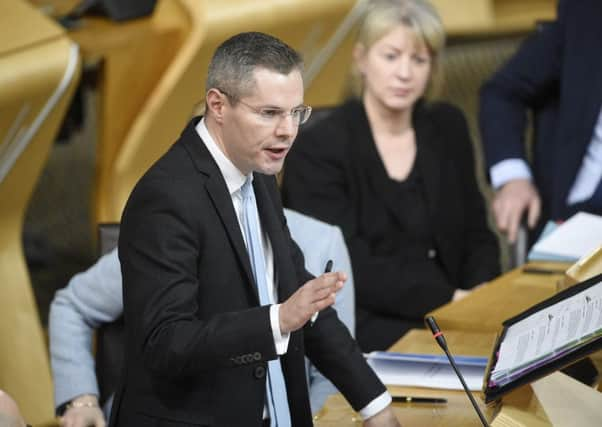Joyce McMillan: SNP need to focus on the long term


Labour, by contrast, wants a 50p tax rate on the top 1 per cent of earners, and a 1p rate increase all round, mainly to help boost Scotland’s struggling local services. And the SNP, it seems, will dip a timid toe into the stormy waters of differential tax rates between Scotland and England by raising the level at which the higher tax rate kicks in only in line with inflation, rather than giving those earning more than £43,000 a year the small extra boost recently signalled by the Westminster government.
The Tories and the Daily Telegraph, of course, call this “clobbering hard-working families”, and attacking the living standards of “middle-class Scots”. Yet in fact, people earning at this level are in or close to the top 10 per cent of earners, far above the “middle” of society. And the additional sum they are being asked to pay is about £6.50 a week, roughly the price of a single large glass of wine in a pub – I would be interested to see substantial evidence, after the fact, that any of them will miss the money at all.
Advertisement
Hide AdAdvertisement
Hide AdIt is, in other words, something of a pity that this exaggerated yowling and breast-beating about very minor tax-rises for the better off has become such an ideological fixation in UK political debate; for if the case for some higher taxation is almost unanswerable, after eight years of austerity, there are many other aspects of the SNP’s current programme that need the sharpest scrutiny, and betray the party’s apparently almost infinite capacity for ideological inconsistency and confusion.
This is a party for, example, that says it wants to reduce tax breaks for the well-off; but is apparently determined to cut Air Passenger Duty, a measure which is not only environmentally questionable, but also disproportionately benefits Scotland’s tiny minority of affluent frequent flyers. This is a party which talks the talk on workers’ rights, and a decent living wage; but also cultivates friendly relations with companies like Amazon – when this week it was claimed that some of its Dunfermline warehouse workers were living in tents at the site, rather than attempt the impossible feat of working long hours, and commuting to and from their homes in Perth on the minimal wages they earn. This is a party which talks about empowering Scottish communities, but has presided over a further drastic decline in the financial autonomy and status of Scottish local government; this year, Scotland’s capital is apparently so cash-strapped that it cannot even afford any significant Christmas lights outside the city centre.
Above all, this is a party that constantly trumpets its green credentials; but which seems incapable of developing a policy on transport, and particularly on new roads and bridge construction, that bears any relation to its low-carbon commitments. And its relationship with the North Sea oil industry suffers from the same ambiguity. As Bank of England governor Mark Carney pointed out this week, carbon reduction targets dictate that most hydrocarbons now still underground will have to remain there. Yet yesterday in the Scottish Parliament, climate change champion Nicola Sturgeon was to be heard heartily agreeing with one of her own MSPs that there are still massive untapped reserves of oil in the North Sea, and that the industry must be supported in exploiting them.
The Scottish Government is not alone, of course, in sending out such mixed signals; they are the depressing common currency of western politics. There are two reasons, though, why this failure of clarity on the part of the Scottish Government is particularly frustrating.
The first concerns its very strong political position – even with the worst possible political luck, the SNP has another four and a half years of government ahead of it at Holyrood, and is likely to be the largest party there until at least 2026. Under these circumstances, it has no excuse for the kind of short-termism that plagues democratic government across the West.
It could afford to take long views, to set up think-tanks and research institutes to develop serious strategic policies, and to demand consistency in pursuing those strategic goals across all departments of government – yet still it does not do so, in ways that could cost us all dearly over time.
And then secondly, this failure is frustrating because Scotland’s potential, in these years of transition away from a carbon-based economy, is so obvious, and so vast. The truth is that if we seize the global opportunities that are emerging now, and use all our expertise to invest in an industrial and energy infrastructure that serves that new low-carbon economy, this country could be looking at a immensely exciting and prosperous future, generating sustainable jobs and an ever-higher quality of life for a growing population who have chosen to make their lives here.
Yet instead, we waste time bickering over the remnants of a neoliberal low-tax ideology that has had its day, and over the prolonging of the most recent wave of hydrocarbon exploitation to come into Scottish communities for a few decades, and then disappear again, leaving them for dead. To say that this is not the way of the future is to state the obvious.
Advertisement
Hide AdAdvertisement
Hide AdAnd the greatest gift Nicola Sturgeon and her government could give Scotland now would be to lift their eyes for a moment from the detail of day-to-day policy, and start drawing a clearer picture of the future to which they want to take us; and of how the paths they are pursuing now will lead us, in time, from here to there.